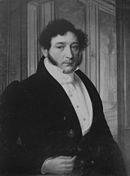Wilhelm Ferdinand Ermeler

Wilhelm Ferdinand Ermeler (born February 6, 1784 in Berlin ; † June 24, 1866 there ) was a Berlin industrialist and secret councilor .
Life
The father Christian Ermeler (1735–1793) was the owner of a calico factory in Berlin, the mother Friederike Amalia, née Crämer (1766–1848), was the daughter of a dye works owner and the third wife. After about a year, the parents divorced and the father married a fourth time. In this marriage, the half-sister Caroline was born, who later became a painter. The boy grew up with his grandmother.
In 1808 Ermeler founded the cigar , smoking and snuff factory Ermeler at Mühlendamm 12/13. In 1818 he moved the manufacture to the house in Cölnischer Fischmarkt 6, which he had bought for 9,000 thalers. In 1824 Ermeler acquired the property at Breite Straße 11 with residential and manufacturing buildings for 40,000 thalers from his competitor Johann Neumann . He was the most important tobacco manufacturer and exporter in Berlin with branches in other places, e.g. B. Schwedt ( Ermelerspeicher ).
Wilhelm Ermeler has been interested in art and culture since his youth. In his house he held regular evenings, on Wednesdays to public, on Sundays to closed parties. Their circle of acquaintances included personalities from Berlin's business, political and cultural life such as the governor General Friedrich von Wrangel , the statesmen Heinrich Friedrich von Itzenplitz and Rudolf von Auerswald , the provost Daniel Amadeus Neander , the architect Christian Daniel Rauch and the art critic Ludwig Rellstab . As Neumann did before, Ermeler and his descendants refrained from making fashionable changes to the town house, which was furnished around 1760, out of love for the Berlin Rococo . They looked after and restored it before the idea of monument protection was publicly recognized decades later. Ermeler, also known for his house's charity events, thus became the savior of the building that was later called the Ermelerhaus . His descendants sold it to the city of Berlin, which turned it into a museum in 1932 . Ermeler supported artists with financial means. He was still painting watercolors at the age of 75.
records
- Diary from 1805 to 1809 , with a presentation of personal development, but also thoughts on current affairs and on culture and art
- Letters from Italy from 1860/61, with travel obsessions and a special interest in the country's cultural monuments
Places of remembrance and honors
- Ermelerhaus on Märkischer Ufer 10 in Berlin. Replica with original parts of the Ermeler's residence, which was demolished in 1967, in the Breite Straße with original parts from 1761/62.
- Honorary grave in the St. Petri-Luisenstadt cemetery in Friedenstrasse in Berlin-Friedrichshain in the SW field, G4, with bronze epitaphs on the churchyard wall for him and his wife Henriette Wilhelmine Ermeler, née Becherer (1791–1852).
- Ermelerspeicher in Schwedt (Oder) , former two-storey tobacco store made of bricks for storing tobacco delivered from the area, today the main building of the city library
- Name of Ermelerstraße in Berlin from 1938 to 1947, before and after Straßmannstraße .
literature
- Marlies Ebert: The history of the family and tobacco company Ermeler. Bourgeois and entrepreneurial life and work in 19th century Berlin . In: Reiner Güntzer (Ed.): Yearbook Stiftung Stadtmuseum Berlin, Vol. VIII 2002 . Henschel Verlag, Berlin 2003, ISBN 3-89487-467-8 , pp. 105-142
Web links
- Wilhelm Ferdinand Ermeler Historic churchyards and cemeteries in Berlin-Brandenburg
- Wilhelm Ferdinand Ermeler City of Schwedt (Oder)
Individual evidence
- ^ Documents on the guardianship of a child by Friederike Amalia Ermeler, née Craemer Brandenburgisches Landeshauptarchiv, from 1784/86, apparently related to Wilhelm or his older sister
- ↑ For Ermeler and the importance of the house see Marlies Ebert: The history of the family and tobacco company Ermeler. Bourgeois and entrepreneurial life and work in 19th century Berlin . In: General Director of the Stadtmuseum Berlin Reiner Güntzer (Ed.): Yearbook Stiftung Stadtmuseum Berlin, Vol. VIII 2002 . Henschel Verlag, Berlin 2003, ISBN 3-89487-467-8 , pp. 105-142.
- ^ Wilhelm Ermeler: Letters from Italy. Offered as a birthday present for my family and their descendants . Berlin 1861, private print
- ↑ Wilhelm Ferdinand Ermeler's grave of honor Historic churchyards and cemeteries in Berlin-Brandenburg, last paragraph, with photos
- ^ Wilhelm Ferdinand Ermeler City of Schwedt (Oder), last paragraph, with photo
| personal data | |
|---|---|
| SURNAME | Ermeler, Wilhelm Ferdinand |
| ALTERNATIVE NAMES | Ermeler, Wilhelm |
| BRIEF DESCRIPTION | Tobacco manufacturer and art patron in Berlin |
| DATE OF BIRTH | February 6, 1784 |
| PLACE OF BIRTH | Berlin |
| DATE OF DEATH | June 24, 1866 |
| Place of death | Berlin |